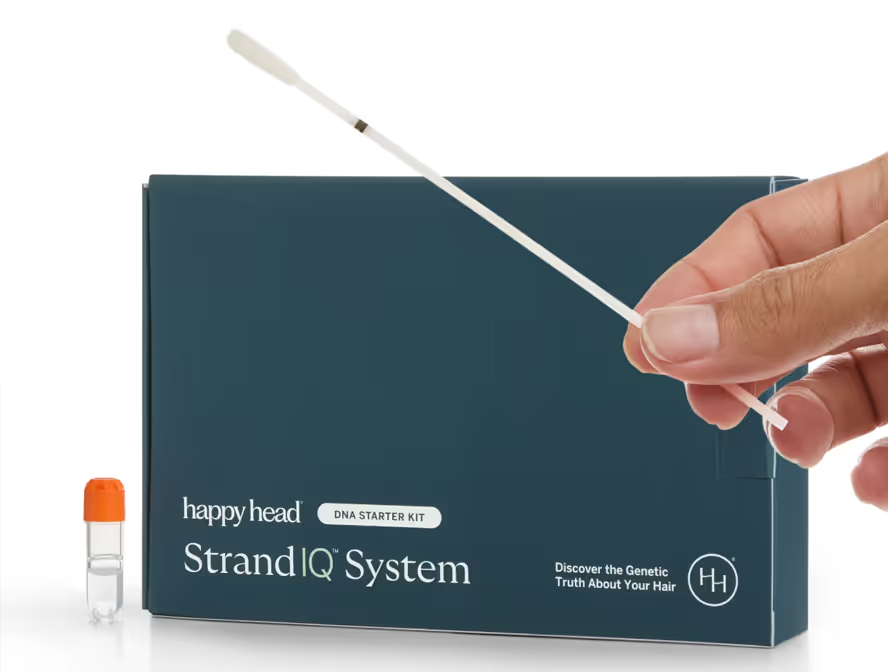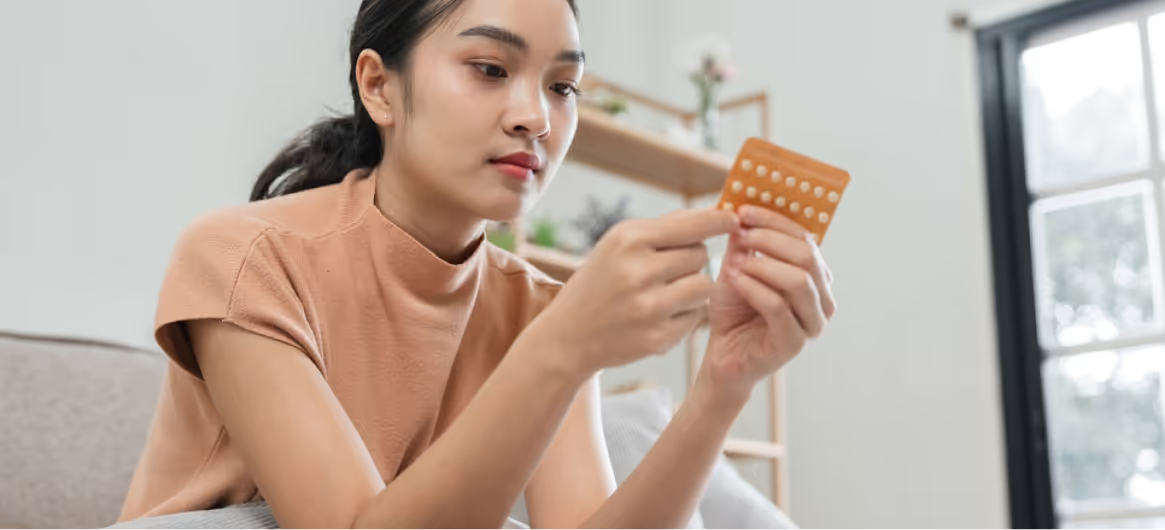Biotin for hair loss has become a common recommendation, but its popularity may be outpacing the science behind it. As a vital nutrient involved in keratin production and cellular metabolism, biotin certainly contributes to hair health, but that doesn’t mean it’s a cure-all.
Hair loss is complex, and finding an effective hair loss product starts by identifying the root cause, not just reaching for the nearest supplement bottle.
Whether you're shedding more than usual or simply seeking healthier hair, understanding biotin's role is key to making informed, effective choices.
The Importance of Biotin
Biotin is often referred to as vitamin B7 or vitamin H, which stands for "Haar und Haut," the German words for hair and skin. It is a water-soluble vitamin essential for converting food into energy.
This B vitamin acts as a coenzyme in the metabolism of carbohydrates, fats, and proteins and supports the production of keratin, a key structural protein essential for maintaining healthy hair, skin, and nails.
While biotin is naturally found in many foods, including eggs, nuts, seeds, fish, and leafy greens, the body also produces small amounts through gut bacteria. Most people get enough biotin through a balanced diet, and true biotin deficiency is rare.
However, when deficiency does occur, it can lead to thinning hair, brittle nails, and skin rashes, making this vitamin important to overall health and hair vitality.
Does Biotin Really Help With Hair Loss?
While studies on biotin specifically for hair loss are limited, it may be beneficial for those with a deficiency.
A 2016 study found that low serum biotin levels can contribute to hair loss and that biotin supplementation can resolve hair loss issues in those with identified deficiencies. More research is still needed to determine its effectiveness in individuals without a deficiency.
Biotin is essential for healthy hair growth, but its benefits are mostly seen in people with a true deficiency, which is rare in those who eat a balanced diet. While supplements are popular, taking extra biotin without a deficiency is unlikely to significantly reduce hair loss.
That said, biotin supplementation is generally safe and may slightly improve hair strength in some people.
Because hair loss can result from many causes, including hormonal changes, medical conditions, or stress, it’s important to consult a dermatologist to determine the underlying issue before starting any supplement or self-treatment plan.
Biotin Deficiency and Hair Loss: Risk Factors
Though rare, biotin deficiency can occur in certain individuals. Risk factors include pregnancy, breastfeeding, chronic alcohol use, smoking, certain medications (like anticonvulsants or antibiotics), and conditions that impair nutrient absorption, such as inflammatory bowel disease.
Consuming large amounts of raw egg whites, which contain avidin—a protein that binds biotin—can also lead to deficiency. People with genetic disorders affecting biotin metabolism are at increased risk and may require lifelong supplementation.
Hair Loss Can Be Caused by Many Factors
Hair loss typically isn’t caused by biotin deficiency alone. Common triggers include genetics (such as male or female pattern hair loss), hormonal imbalances, thyroid disorders, iron deficiency, autoimmune diseases, chronic stress, certain medications, and tight hairstyles.
Because hair loss often involves complex, overlapping factors, it's best to seek evaluation from a board-certified dermatologist who can identify the root cause and recommend the most effective treatment.
Who Might Benefit From Biotin for Hair Loss?
While biotin supplements are often marketed as a solution for hair loss, they may not be necessary for everyone. So, who might see the most benefit from adding biotin to their hair care routine?
Only those with a verified biotin deficiency are likely to see hair improvements with supplementation. Certain groups, such as pregnant women and people with digestive disorders that affect nutrient absorption, may be at a higher risk for deficiency.
Signs of a deficiency may include thinning hair, brittle nails, and dry scaly skin, but this is not something that can be self-diagnosed. Your primary care provider or dermatologist can run a simple blood test to identify any nutritional deficiencies.
Even if you don't have a biotin deficiency, you may still be interested in trying biotin supplements for hair loss. While the evidence is limited, some people report positive results.
It's always best to consult with a healthcare provider to determine if biotin is right for you and to rule out any underlying health issues that may be contributing to hair loss.
How To Use Biotin for Hair Loss
If you're looking to incorporate biotin into your hair loss prevention strategy, there are both natural and supplemental options to consider.
Best Food Sources of Biotin for Hair Health
Many foods contain biotin, making it not only possible but easy to get your daily dose through diet alone.
Some of the best biotin-rich foods include eggs (especially the yolks), nuts and seeds (like almonds, walnuts, and sunflower seeds), legumes (such as soybeans and lentils), whole grains (like oats and barley), mushrooms, bananas, and cauliflower.
Incorporating these foods into your meals can help ensure you're getting enough biotin to support healthy hair.
Biotin Supplements for Hair Loss: What To Consider
If you're considering biotin supplements for hair loss, there are a few things to keep in mind. First, look for a high-quality supplement from a reputable brand. It's also important to choose a supplement with the right dosage for your needs. Also consider hair growth supplements that contain a blend of ingredients, including biotin.
The recommended daily intake of biotin for adults is 30 micrograms, but some supplements contain much higher doses. The optimal dosage of biotin for hair loss may vary depending on individual factors, such as age, health status, and the severity of hair loss.
While biotin is generally considered safe, even in high doses, it's always best to talk to your healthcare provider before starting any new hair growth supplement regimen.
Risks and Side Effects of Biotin for Hair Loss
While biotin is generally considered safe, even in high doses, it's important to be aware of potential risks and side effects.
Some people may experience digestive upset, such as nausea or diarrhea, when taking high doses of biotin. There have also been rare reports of skin rashes and allergic reactions.
Another potential concern is that high doses of biotin can interfere with certain lab tests, such as those for thyroid function and troponin (a marker of heart damage). If you're taking biotin supplements and need to undergo lab testing, be sure to inform your healthcare provider.
Can You Use Biotin and Minoxidil Together?
Yes, using biotin internally, via supplement or diet, alongside topical minoxidil is generally considered safe for most people, as they act through complementary pathways.
Biotin supports keratin infrastructure and metabolic processes from within, while minoxidil works externally to stimulate blood flow and follicle activation. Because they work via distinct mechanisms, combining them often makes sense for holistic support.
Some Happy Head formulations, such as our new Hair Serum, already include powerful nutrient blends (e.g., vitamins, peptides) to reinforce internal support, while minoxidil addresses follicles directly.
While combining biotin and minoxidil can be beneficial, you should always consult your dermatologist before stacking treatments.
Do They Work Better Together?
While results vary, biotin and minoxidil can complement each other when used together. Biotin supports stronger hair structure and growth readiness, while minoxidil stimulates active regrowth.
There’s no need to stop one before starting the other, as most dermatologists allow both to begin simultaneously. However, if you’re new to treatment, you might want to consider introducing minoxidil first to monitor scalp tolerance before adding supplements.
Always follow professional guidance for timing, dosage, and potential product combinations.
Additional Ways To Support Hair Growth
In addition to biotin, other nutrients and strategies can support healthy hair growth. Iron, vitamin D, zinc, and omega-3 fatty acids are especially important; deficiencies in these can contribute to shedding or thinning. A well-balanced diet rich in whole foods is key.
Stress management is also essential, as chronic stress can trigger telogen effluvium, a form of temporary hair loss. Regular exercise, adequate sleep, and mindfulness practices may help maintain hormonal balance.
Gentle hair care practices, such as avoiding excessive heat, chemical treatments, and tight hairstyles, can prevent breakage and traction alopecia.
Professional Guidance
If you're experiencing significant hair loss or aren't seeing results with biotin and other natural remedies, it may be time to talk to a dermatologist specializing in hair loss solutions.
They can help identify any underlying health issues and recommend targeted treatments, such as minoxidil, which is FDA-approved and effective for many types of hair loss.
In some cases, other prescription medications, such as finasteride, dutasteride, or spironolactone, may be needed to address hormonal causes. Microneedling and platelet-rich plasma (PRP) therapy are also emerging options with promising results.
For persistent hair loss, a professional evaluation ensures targeted and effective treatment. Visit Happy Head today to learn how easy it is to receive an online consultation with a board-certified dermatologist and have customized treatments discreetly shipped directly to your door.
Biotin for Hair Loss: Is It Right for You?
Hair loss can be distressing, but the right solution depends on understanding its root cause. While self-care and supplements may help, the most effective approach starts with a professional evaluation.
A dermatologist can identify whether nutritional gaps, hormonal shifts, or other factors are at play and guide you toward treatments that truly work.
If you decide to try biotin for hair loss, remember that, while supplements are available, biotin can be obtained naturally from a variety of foods, and that you won’t see results overnight—hair growth is a slow process that requires patience.
Talk to a board-certified dermatologist to discuss your goals and find the solution that is best for you.
Frequently Asked Questions
Does biotin actually help with hair loss?
Biotin may help improve hair strength and growth in people with a deficiency, but it’s unlikely to benefit those with normal levels. While it's often included in hair supplements, there’s limited evidence that it helps with hair loss in healthy individuals.
How long does biotin take to work for hair?
Biotin’s effects on hair growth are gradual. If a deficiency is present, you may start to see improvement in hair strength and reduced shedding within 3–6 months of consistent use. Results can vary, but biotin isn’t likely to speed hair growth in those without a deficiency.
Can biotin regrow hair?
Biotin can promote hair regrowth in people with a true deficiency, which is rare. In such cases, supplementation may restore hair health. However, for most individuals with hair loss due to other causes, biotin alone is unlikely to regrow hair.
What are the side effects of taking biotin?
Biotin is generally safe, but high doses may cause skin rashes, digestive upset, or interact with medications. Most notably, it can interfere with blood test results, including thyroid and heart tests, potentially leading to misdiagnosis.
Does minoxidil work better than biotin?
Minoxidil generally works better than biotin for stimulating new hair growth because it directly increases blood flow to hair follicles and extends the growth phase. Biotin supports overall hair strength and health, but doesn’t actively trigger regrowth like minoxidil does. However, they can complement each other when used simultaneously.












